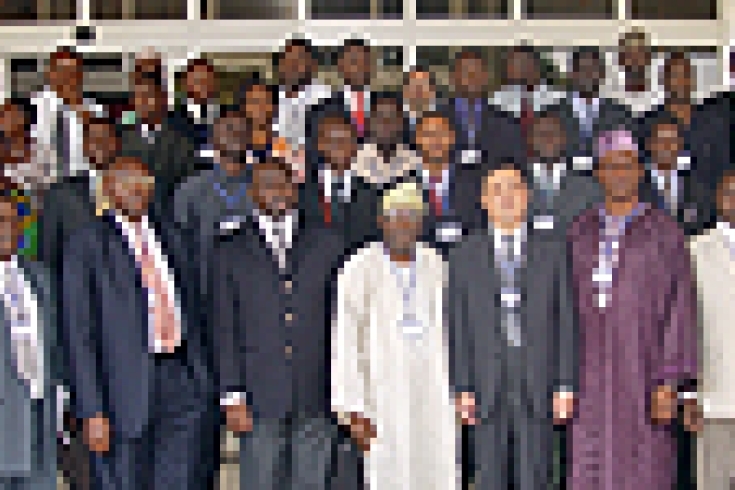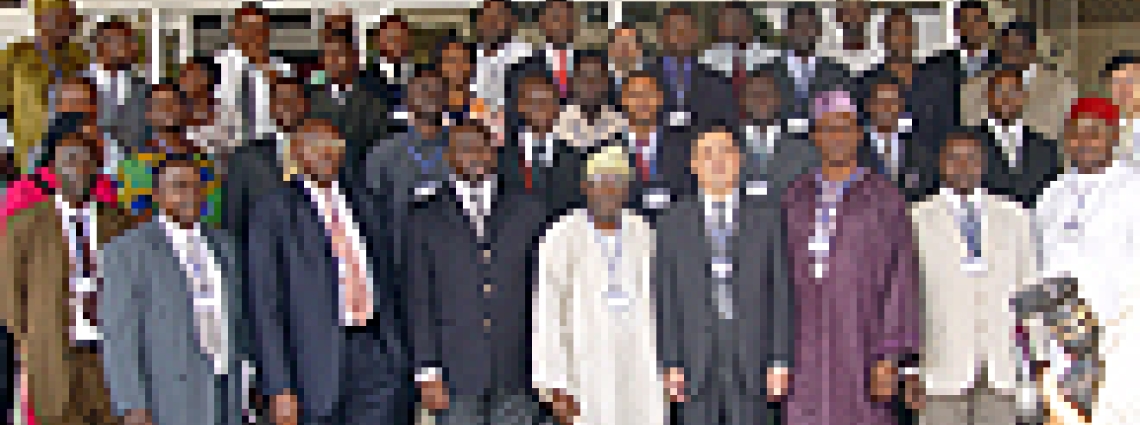A CTBTO international cooperation workshop for ECOWAS Member States was held in Abuja, Nigeria
At the invitation of the Federal Government of Nigeria, the Comprehensive Nuclear-Test-Ban Treaty Organization (CTBTO) held a two-day international cooperation workshop for ECOWAS Member States in Abuja from 30 November to 1 December 2006. The workshop was organized by the Provisional Technical Secretariat (PTS) of the Preparatory Commission for the CTBTO in collaboration with the Nigerian Federal Ministry of Science and Technology, the Ministry of Foreign Affairs and the ECOWAS Secretariat.
About eighty participants took part in the workshop. They included representatives of Governments, universities, research institutes, the Eastern and Southern African Regional Seismological Working Group (ESARSWG) and PTS staff.
The main objective of the workshop was to provide a forum to enhance the understanding of the Comprehensive Nuclear-Test-Ban Treaty (CTBT) in order to facilitate the earliest possible establishment of the verification regime and to promote the universality of the Treaty through ratification by those States that had not yet done so. In this context, the workshop explored ways and means to promote, within the sub-region, the civil and scientific applications and benefits of the CTBT verification technologies as well as increase cooperation among ECOWAS States in areas such as capacity building, public enlightenment and sharing of information within the CTBT framework.
Presentations were made by experts on different aspects of the verification regime including the International Monitoring System (IMS), opportunities for technical cooperation with the CTBTO as well as the civil and scientific benefits of the CTBT verification technologies.
In his opening statement read by Dr. Julius A. Aremu, Director of the Department of Industrial Technology and Energy Research, Professor Turner T. Isoun, Minister of Science and Technology of Nigeria, recalled that the Treaty's primary objective to contribute effectively to the prevention of the proliferation of nuclear weapons in all aspects and to nuclear disarmament was a noble objective given the controversial nature which nuclear technology had generated in today's world. He reaffirmed that Nigeria's Nuclear Energy Programme (NNEP) was designed for peaceful purposes such as electricity generation, agriculture, health, industry, science and technology research and development.

Participants at the workshop in Abuja
Mr. Ziping Gu, Director of the Legal and External Relations Division of the CTBTO Preparatory Commission, in his address on behalf of the Executive Secretary of the CTBTO, expressed his sincere thanks to the Government of Nigeria and the ECOWAS Secretariat for hosting the workshop. He said that the CTBTO would like to strengthen its cooperation with countries in the sub-region as well as with the ECOWAS Secretariat by promoting closer participation of States Signatories in its work and by assisting in strengthening national capacities. He said that the year 2006 marked the 10th anniversary of the opening for signature of the CTBT and that in this time emphasis had been laid on the promotion of entry into force and the establishment of the verification regime as stipulated by the CTBT. The CTBT verification technologies had the potential to offer important additional benefits. Data could be used in a variety of fields, including studies of the earth's structure as well as for research on earthquakes, volcanic eruption forecasting, underwater explosion location, sea temperature and climate change monitoring. He concluded by saying that the sophisticated verification regime would only prove its worth when the CTBT entered into force. He urged ECOWAS Member States to continue to support the work of the CTBTO and invited those countries that had not yet ratified the Treaty to do so as soon as possible.
During the two-day workshop, representatives of States held discussions on how cooperation on CTBT matters between Member States in the sub-region could be increased. They also held discussions on how cooperation on CTBT matters could be improved between ECOWAS Member States and other States in Africa, as well as between the CTBTO and ECOWAS Member States.
At the conclusion of the workshop, participants issued a number of recommendations. They encouraged ECOWAS Member States that had not yet ratified the Treaty to do so as soon as possible. They also underscored the need for ECOWAS Member States to establish a regional group based on the model of the ESARSWG in order to facilitate technical cooperation among Member States. They called upon ECOWAS Member States to establish a Sub-regional Data Centre to collate, process and archive data from all national data centres and other operating stations in the sub-region. They requested the assistance of the CTBTO in achieving these goals through training and strengthening of access to secure online support services such as e-learning.
2 Apr 2008
